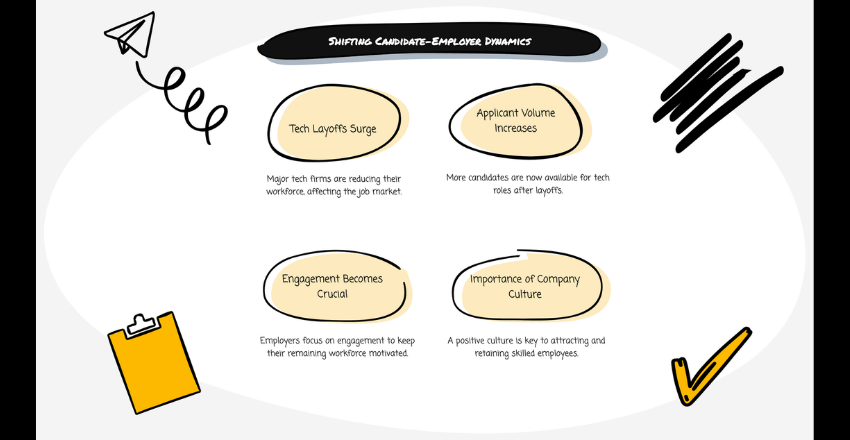On-site teams were the gold standard in the tech industry for years. Yet, geographical constraints and struggle for talent have been inevitable challenges. With over a decade spent in the tech world, I’ve seen the dynamic shift towards remote hiring. It is the future – flexible, cost-effective and centered around acquiring global talent.
Remote work is no longer just a trend; it has become a fundamental shift in how the tech industry operates. The rapid advancements in technology and the global pandemic have accelerated the adoption of remote and hybrid work models, transforming the landscape of tech hiring.
Remote and Hybrid Work Models
The pandemic has forced companies to rethink their work models, leading to a significant shift towards remote and hybrid work. These models offer flexibility, allowing companies to attract talent from various locations without being constrained by geographical boundaries. Remote work has become a standard offering, with many tech companies adopting hybrid models to balance in-person collaboration with the convenience of working from home.
Example: Companies like Google and Microsoft have embraced hybrid work models, allowing employees to split their time between the office and remote locations. This approach has enabled them to retain top talent while fostering a collaborative environment.
AI-Powered Collaboration Tools

AI-powered collaboration tools are revolutionizing remote work. Virtual assistants, intelligent meeting platforms, and automated task management are enhancing communication and collaboration among distributed teams. These tools ensure that remote employees can work seamlessly, regardless of their location.
“AI tools are not just enhancing productivity; they are reshaping the way we collaborate. The integration of AI in daily tasks allows for more efficient workflows and better team coordination.”
Improved Cybersecurity Solutions
With the increase in remote work, cybersecurity has become a top priority. Companies are investing in robust cybersecurity solutions such as encryption technologies, multi-factor authentication, and cloud-based security management to protect sensitive data and ensure secure communication channels.
Example: IBM has developed advanced cybersecurity solutions to protect its remote workforce, including AI-driven threat detection and response systems.
Virtual and Augmented Reality
Virtual Reality (VR) and Augmented Reality (AR) are emerging as powerful tools for remote work. VR can create immersive virtual office environments, enabling remote teams to interact as if they were in the same physical space. AR, on the other hand, facilitates real-time remote troubleshooting and product demonstrations, making it easier for teams to collaborate on complex tasks.
“The potential of VR and AR in remote work is immense. These technologies can bridge the gap between physical and virtual spaces, creating a more engaging and interactive remote work experience.”
Focus on Results Over Hours
The traditional 9-to-5 work model is being replaced by a focus on results and productivity. Companies are setting clear goals and objectives, evaluating employees based on their output rather than the number of hours worked. This shift promotes a healthier work-life balance and encourages employees to work more efficiently.
Example: Atlassian has implemented a results-oriented work environment, where employees are evaluated based on their achievements rather than their time spent working. This approach has led to higher productivity and job satisfaction.
Access to a Global Talent Pool
One of the most significant advantages of remote work is access to a global talent pool. Companies are no longer limited to hiring within their geographical area and can now tap into a diverse range of skilled professionals from around the world. This expanded talent pool allows companies to find the best candidates for their roles, regardless of location.
“Remote work has democratized access to talent. Companies can now hire the best and brightest from anywhere in the world, leading to more diverse and inclusive teams.”
Managing Remote Teams
Managing remote teams comes with its own set of challenges. Companies need to ensure effective communication, foster a strong company culture, and maintain team cohesion despite the physical distance. Investing in team-building activities, regular check-ins, and clear communication channels is essential for managing remote teams successfully.
Example: Buffer, a fully remote company, has implemented regular virtual team-building activities and transparent communication practices to maintain a strong company culture and keep their remote teams engaged.
Increasing Share of Remote Job Postings

The share of remote job postings is on the rise, particularly among public companies. This trend indicates that remote work is becoming more widely accepted and that companies are recognizing the benefits of offering remote positions.
“The increase in remote job postings is a clear indication that remote work is here to stay. Companies are realizing that offering remote work options can help attract and retain top talent.”
Leadership and Senior Roles Going Remote
Interestingly, senior leadership and experienced roles are more likely to be offered as remote positions compared to entry-level roles. This trend highlights the growing acceptance of remote work at all levels of an organization and the recognition that experienced professionals can effectively lead and manage teams from a distance.
Example: GitLab, an all-remote company, has senior leadership positions that are entirely remote, demonstrating that even top-level executives can thrive in a remote work environment.
Increased Demand for Remote Tech Talent
Despite industry-wide layoffs, the demand for remote tech talent is surging. Companies like Veeva, Pinterest, and Samsara are leading this trend, recognizing the value of remote work in attracting top talent, promoting work-life balance, and boosting productivity and innovation.
“The demand for remote tech talent is a testament to the growing acceptance of remote work. Companies are realizing that remote work can lead to higher productivity and job satisfaction.”
Job Growth in the Tech Industry
The tech industry is expected to see strong job growth in the coming years. The increasing demand for technical skills such as cloud computing, artificial intelligence, and cybersecurity is driving this growth. Companies are actively seeking professionals with these skills to stay competitive in the rapidly evolving tech landscape.
Example: Amazon Web Services (AWS) is continuously hiring cloud computing experts to meet the growing demand for cloud services, reflecting the industry’s focus on technical skills.
Shifting Candidate-Employer Dynamics

The dynamic between candidates and employers has shifted due to recent layoffs from major tech companies. While this has increased the volume of applicants for tech roles, companies must focus on maintaining employee engagement and a positive company culture to retain talent.
“In today’s competitive job market, companies need to prioritize employee engagement and create a positive work environment to attract and retain top talent”.
Rise of AI in the Workforce
AI is becoming an integral part of the tech workforce. Many tech professionals are using AI tools like ChatGPT to enhance their productivity. Forward-thinking companies are embracing AI to help workers perform their jobs faster and with greater accuracy.
Example: Salesforce has integrated AI tools into its customer relationship management (CRM) platform, enabling employees to work more efficiently and make data-driven decisions.
Hybrid and Remote Work Models
While the volume of fully remote roles has declined since its peak in 2022, hybrid roles are becoming more common. These roles offer a balance between flexibility for employees and oversight for companies, helping to attract a wider talent pool.
“Hybrid work models provide the best of both worlds. They offer flexibility for employees while allowing companies to maintain a level of oversight and control.”
Soft Skills

In addition to technical skills, soft skills such as communication, problem-solving, critical thinking, and adaptability are increasingly important. These skills are essential for building teams, motivating employees, and fostering innovation.
Example: Google places a strong emphasis on soft skills in its hiring process, recognizing that these skills are crucial for collaboration and problem-solving in a remote work environment.
Continuous Learning
Companies are investing in upskilling programs to keep their employees’ skills up-to-date and to retain talent. Structured training programs help employees acquire new skills, stay competitive, and comply with business best practices.
“Continuous learning is key to staying competitive in the tech industry. Companies that invest in upskilling programs will have a significant advantage in attracting and retaining top talent.” Declining Emphasis on College Degrees
There is a growing trend towards skills-based hiring rather than relying solely on traditional degrees. This approach helps employers broaden their talent pool and foster more diverse teams.
Example: Companies like IBM have adopted skills-based hiring practices, focusing on candidates’ abilities and experiences rather than their educational background.
Higher Work Satisfaction in Remote Work Cultures
Companies with a mostly remote work culture tend to have higher work satisfaction ratings. This suggests a strong relationship between remote work and employee satisfaction.
“Remote work can lead to higher job satisfaction as it offers employees more flexibility and autonomy. Companies that embrace remote work are likely to see happier and more engaged employees.”
What are the top skills companies are looking for in remote tech talent
Technical Skills
1. Machine Learning (ML) and Artificial Intelligence (AI)
Importance: These skills are crucial for developing intelligent systems and applications. AI and ML are becoming integral in various industries, from chatbots to predictive analytics.
Key Skills: Domain knowledge, programming languages (e.g., Python), and data analysis.
2. Cloud Computing
Importance: With the rise of remote work, cloud computing skills are essential for managing and deploying cloud-based solutions.
Key Skills: Configuration, deployment, security, management, and troubleshooting of cloud platforms like AWS, Google Cloud, and Microsoft Azure.
3. Cybersecurity
Importance: As remote work increases, so do the risks of cyber-attacks. Cybersecurity skills are vital for protecting company data and IT infrastructure.
Key Skills: Handling sensitive data, cloud security, and IT infrastructure protection.
4. Data Handling and Storytelling
Importance: The ability to collect, prepare, visualize, analyze, and communicate data is critical for making informed business decisions.
Key Skills: Data collection, preparation, visualization, analysis, and storytelling.
5. User Experience (UX) Design
Importance: UX design ensures that technology is user-friendly, which is crucial for customer satisfaction and product usability.
Key Skills: Market and audience research, creating user personas, designing wireframes, and testing.
6. Programming Languages
Importance: Proficiency in programming languages is fundamental for software development and various IT roles.
Key Skills: Languages such as Java, JavaScript, C++, and Python.
7. Blockchain
Importance: Blockchain technology is gaining traction for its secure and transparent nature, making it valuable for various applications beyond cryptocurrencies.
Key Skills: Understanding of cryptographic features, blockchain platforms, and applications in finance, healthcare, and supply chain.
Professional Skills
1. Adaptability and Flexibility
Importance: The ability to adapt to new technologies and work environments is crucial in a rapidly changing tech landscape.
Key Skills: Being open to learning new skills and adjusting to different work setups.
2. Communication and Collaboration
Importance: Effective communication and collaboration are essential for remote teams to function smoothly.
Key Skills: Clear communication, active listening, and teamwork.
3. Problem-Solving and Critical Thinking
Importance: The ability to solve complex problems and think critically is highly valued in tech roles.
Key Skills: Analytical thinking, creativity, and decision-making.
4. Project Management
Importance: Managing projects efficiently is key to ensuring that tasks are completed on time and within budget.
Key Skills: Understanding project management methodologies (e.g., Agile), managing project lifecycles, and stakeholder communication.
5. Business Acumen
Importance: Understanding the business context and priorities helps tech professionals align their work with organizational goals.
Key Skills: Knowledge of business operations, priorities, and challenges
Wrapping up
The trends in remote tech hiring are reshaping the future of work. From the adoption of hybrid work models to the integration of AI and VR, these trends highlight the evolving nature of the tech industry. Companies that embrace these changes and adapt to the new landscape will be well-positioned to attract and retain top talent, drive innovation, and achieve long-term success.
Source Links
https://www.vox.com/technology/2023/6/20/23762655/tech-perk-remote-work-freedom-airbnb-yelp















